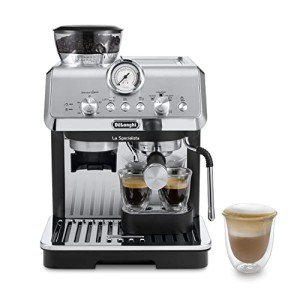10 Things You've Learned In Kindergarden That Will Aid You In Obtaining Home Use Espresso Machines
Home Use Espresso Machines: A Comprehensive Guide
Espresso machines have ended up being a staple in lots of households as coffee lovers seek to duplicate café-quality brews in the comfort of their kitchen areas. The rise in appeal has caused a varied market filled with different designs, functions, and costs. This post aims to provide a useful overview of home use espresso machines, helping readers navigate their choices efficiently.
Understanding Espresso Machines
Espresso machines work by forcing warm water through finely-ground coffee under high pressure, leading to a concentrated coffee drink called espresso. There are numerous types of espresso machines categorized based on their developing approaches and level of automation. The most common types include:
Manual Espresso Machines: These require the user to control the pressure and water flow, enabling for a more hands-on coffee-making experience.
Semi-Automatic Espresso Machines: These provide automatic control over water pressure, while the user by hand grinds and tamps the coffee.
Automatic Espresso Machines: With the push of a button, these machines automatically control the circulation of water, making it easier to brew espresso with constant results.
Super-Automatic Espresso Machines: These all-in-one machines manage grinding, tampering, brewing, and even milk frothing, making them ideal for users trying to find convenience.
Capsule or Pod Machines: These use pre-packaged coffee pods to create espresso with very little effort, but they restrict option in brewing strategies and flavors.
Table: Comparison of Espresso Machine Types
Type
Control Level
Relieve of Use
Cleaning Level
Ideal For
Manual
User-controlled
Moderate
High
Coffee purists
Semi-Automatic
Partial automation
Moderate
Moderate
Home baristas
Automatic
Totally automated
Easy
Low
Busy individuals
Super-Automatic
Totally automated
Very simple
Very low
Convenience applicants
Capsule/Pod
Completely automated
Very simple
Extremely low
Casual drinkers
Key Features to Consider
When choosing a home use espresso machine, it's vital to think about various features that can considerably impact the quality of espresso and user experience.
Pressure: Look for machines that provide at least 9 bars of pressure, as this is considered optimal for developing espresso.
Boiler Systems: Single vs. dual boiler systems determine temperature stability and the capability to brew espresso and steam milk concurrently.
Grinder: Integrated grinders enable freshly ground coffee, which enhances taste. Consider machines with adjustable grind settings.
Milk Frother: For those who delight in coffees and lattes, an integrated steam wand or automatic frother is crucial.
Size and Design: Consider your kitchen area and aesthetic choices. Machines come in numerous sizes, from compact to big setups.
Cost: Home espresso machines can vary from a few hundred to numerous thousand dollars, so it's crucial to develop a budget before checking out alternatives.
Pros and Cons of Home Use Espresso Machines
Pros
Cons
Convenience of developing coffee at home
Preliminary investment can be high
Quality of espresso is frequently remarkable
Requires some skill, specifically with manual machines
Ability to explore tastes
Maintenance and cleansing can be labor-intensive
Can save money in the long run
Not all machines will suit every coffee preference
Maintenance and Cleaning Tips
Maintaining an espresso machine is vital for lengthening its life and ensuring constant brew quality. Here are some helpful pointers:
Regular Descaling: Minerals from water can construct up in the machine. Descale every 1-3 months, depending upon water firmness.
Daily Cleaning: Rinse portafilters, baskets, and steam wands after each use to prevent coffee oils from constructing residue.
Use Filtered Water: This can help minimize mineral accumulation and improve the taste of coffee.
Change Gaskets and Seals: These components might wear in time and needs to be changed to preserve pressure and efficiency.
Check out the Manual: Each machine has specific care directions; following these will guarantee durability.
FAQs About Home Use Espresso Machines
**Q1: What is the best budget espresso machine?The best budget espresso machine often depends upon specific needs, however designs like the DeLonghi EC155 or the Breville Bambino are popular amongst users for providing great value. Q2: How long do home espresso machines normally last?With proper upkeep, home espresso machines can last anywhere from 5 to 15 years, depending on the quality of the machine and frequency of use. Q3: Can I make coffees and lattes with any espresso machine?While most espresso machines can make coffees and lattes, having a reliable
steam wand or frother is important for accomplishing the best milk texture.
Q4: Are super-automatic machines worth the investment?For those who prioritize benefit and quick brewing, super-automatic machines can be worth the investment, though they may do not have some customizability in brew strength and taste. Energy-Efficient Espresso Machines : What kinds of coffee beans are best for espresso?While individual preference plays a role, beans identified as” espresso “blends are generally roasted darker, developing rich flavors and a velvety texture when brewed.
Investing in a home espresso machine can change the everyday coffee routine into something unique, elevating home brews to café quality. By comprehending the different types of machines, essential features to consider, upkeep needs, and weighing the
advantages and disadvantages, consumers can make educated decisions that fit their private preferences. As Discounted Espresso Machines continues to grow, no matter the option, every brew can be a scrumptious experience waiting to be enjoyed.  **
**